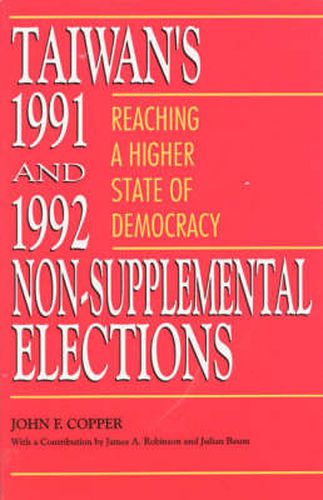Readings Newsletter
Become a Readings Member to make your shopping experience even easier.
Sign in or sign up for free!
You’re not far away from qualifying for FREE standard shipping within Australia
You’ve qualified for FREE standard shipping within Australia
The cart is loading…






Recent years have witnessed an unprecedented interest on the part of both scholars and the media in Taiwan’s politics in general and its political development more specifically. John Copper’s new book, Taiwan’s 1991 and 1992 Non-Supplemental Elections: Reaching a Higher State of Democracy, examines Taiwan’s departure from holding only supplemental elections-a practice that allowed many delegates to remain in office for years and thus called into question the competitive nature of Taiwan’s electoral system-marks a new phase in Taiwan’s democratization. Copper points out, though, that these elections need to be related to other factors of political development. He discusses how economic and cultural factors such as Taiwan’s rapid economic growth in the ‘60s and '70s and the resulting urbanization of the country contributed to a political atmosphere that would allow the departure from supplemental elections.
$9.00 standard shipping within Australia
FREE standard shipping within Australia for orders over $100.00
Express & International shipping calculated at checkout
Recent years have witnessed an unprecedented interest on the part of both scholars and the media in Taiwan’s politics in general and its political development more specifically. John Copper’s new book, Taiwan’s 1991 and 1992 Non-Supplemental Elections: Reaching a Higher State of Democracy, examines Taiwan’s departure from holding only supplemental elections-a practice that allowed many delegates to remain in office for years and thus called into question the competitive nature of Taiwan’s electoral system-marks a new phase in Taiwan’s democratization. Copper points out, though, that these elections need to be related to other factors of political development. He discusses how economic and cultural factors such as Taiwan’s rapid economic growth in the ‘60s and '70s and the resulting urbanization of the country contributed to a political atmosphere that would allow the departure from supplemental elections.